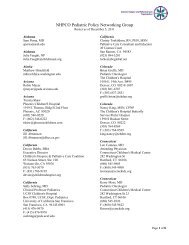CORPORATE PRACTICE OF MEDICINE DOCTRINE 50 STATE ...
CORPORATE PRACTICE OF MEDICINE DOCTRINE 50 STATE ...
CORPORATE PRACTICE OF MEDICINE DOCTRINE 50 STATE ...
You also want an ePaper? Increase the reach of your titles
YUMPU automatically turns print PDFs into web optimized ePapers that Google loves.
State Brief Statement of Law Summary of Legal Guidance*<br />
Georgia State law is unclear with respect to CPOM.<br />
Physicians may be disciplined or refused a license if they<br />
knowingly aid an unlicensed person or entity in practicing<br />
medicine. See Ga. Code § C24 43-34-37(a)(9) (2005).<br />
Although a statute that prohibited a physician from being<br />
employed by a corporation was repealed in 1982, recent<br />
case law indicates that a corporation may not employ a<br />
physician to provide medical services.<br />
A court indicated that Ga. Code § 43-34-37 still does not<br />
allow a corporation to employ a professional to perform his<br />
or her profession on behalf of the corporation. See Clower v.<br />
Orthalliance, Inc., 337 F. Supp. 2d 1322, 1330 (N.D. Ga.<br />
2004).<br />
Hawaii State statutes and regulations do not address CPOM. No additional guidance is available.<br />
Idaho State statutes and regulations do not address CPOM. A hospital may not practice medicine or surgery, even though<br />
it may own or provide facilities for such activities. There<br />
An Attorney General Opinion appears to prohibit must be a direct relationship between the patient and the<br />
hospitals from employing physicians to provide medical medical professional. See Idaho Op. Att'y Gen. (May 26,<br />
services.<br />
1954).<br />
Illinois State statutes allow a hospital or hospital affiliate Licensed hospitals and hospital affiliates may employ<br />
corporation to employ physicians to provide medical licensed physicians if they meet certain requirements. See<br />
services.<br />
210 Ill. Comp. Stat. 85/10.8 (2005).<br />
Case law appears to prohibit unlicensed corporations<br />
from employing physicians to provide medical services;<br />
however, case law allows licensed hospitals to employ<br />
physicians because licensed hospitals possess legislative<br />
authority to provide medical services.<br />
Licensed hospitals may employ physicians and practice<br />
medicine. See Berlin v. Sarah Bush Lincoln Health Ctr., 688<br />
N.E.2d 106, 113 (Ill. 1997).<br />
The hospital exception to the prohibition of the CPOM<br />
doctrine is very narrow. The court refused to extend it to a<br />
non-profit health care institute (not a hospital) that employed<br />
a physician. See Carter-Shields, M.D. v. Alton Health Inst.,<br />
777 N.E.2d 948, 958 (Ill. 2002).<br />
*This Legal Guidance section summarizes a state's CPOM related laws, regulations, case law and other guidance that existed as of September 2006. This section<br />
does not distinguish between states that enforce their CPOM prohibitions versus those that do not. To gather further information regarding your particular state's<br />
enforcement (or lack thereof) of any CPOM prohibition, hospices and palliative care programs may wish to contact their state association to determine whether it<br />
has researched CPOM in the state.<br />
THIS SURVEY DOES NOT CONSTITUTE LEGAL ADVICE NOR SERVE AS A SUBSTITUTE FOR LEGAL ADVICE<br />
Prepared in September 2006 by The Hospice and Palliative Care Practice Group of Reinhart Boerner Van Deuren s.c.<br />
MW\1349194 5









